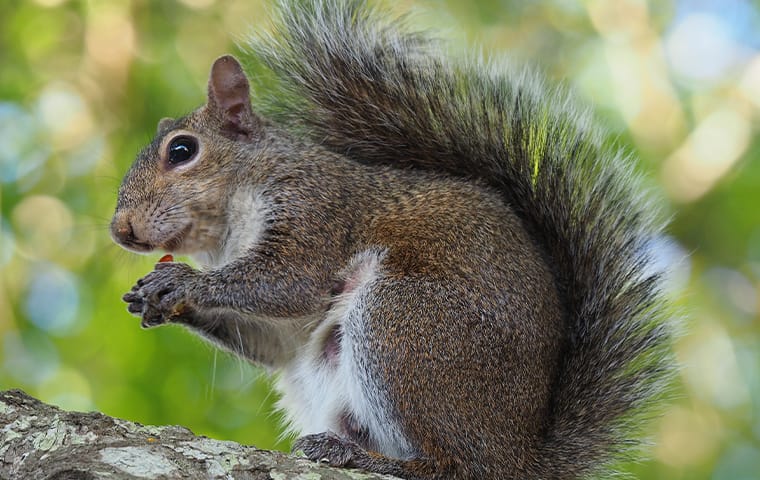What is wildlife?
Wildlife is a term used to describe wild animals that live outdoors on their own, relying on their instincts for survival. However, as our habitats have merged, these wild animals have come to take advantage of the food, water, and shelter that our properties unintentionally provide to them.

Three of the most common species of wildlife here in the Atlanta Metropolitan area are listed below:
Opossums
These are the only species of marsupial found living in the United States. Marsupials have young that are born underdeveloped and finish their development in an external pouch located on the mother’s abdomen. Opossums live alone and are active at night. They have long, narrow faces covered in fur that is lighter in color than the rest of their bodies, which are covered in whitish-gray fur and sprinkled with long guard hairs. Opossums also have prehensile (gripping) tails which are hairless.
Raccoons
These animals are about the size of house cats. They are nocturnal and are rarely seen by people during the day. Raccoons have a distinct mask of black fur around their eyes, a tail ringed in gray and black fur, and dense salt-and-pepper-colored fur over their bodies. Their paws are hand-like and give them the ability to manipulate objects easily.
Squirrels
Squirrels are a type of rodent. They come in a variety of colors including whitish gray, yellowish, red, or brown. Their bellies are usually lighter in color than the rest of their bodies and they typically have long, bushy tails.
Is wildlife dangerous?
The fact that wild animals are not domesticated makes them unpredictable and dangerous. Wildlife that feels threatened or cornered will lash out by biting, scratching, or performing other aggressive behaviors. Also, wild animals carry and spread a variety of diseases in their saliva, urine, and excrement that can make people very ill. Additionally, wildlife can cause a lot of destruction in yards by digging through trash, gardens, and lawns while foraging for food, and they can also cause structural damage by nesting under decks, sheds, and foundations; their chewing and digging habits can cause fires and water damage.
Why do I have a wildlife problem?
People and wild animals sometimes share the same habitats. Therefore, wildlife often live close to, or even on, our property. They are attracted to yards that offer easy access to food and water. Things like gardens, compost bins, leaky fixtures, birdbaths, pet food, and garbage cans will attract wildlife.
Where will I find wildlife?
Opossums prefer to live outside close to rivers, streams, and other water sources. They nest in hollow trees under piles of brush, in the abandoned burrows of other animals, or inside outbuildings like garages or barns. Raccoons are common in wooded areas, but also live around farms, fields, and in suburban neighborhoods. They create dens in the ground, under decks or sheds, between rocks, and in hollow trees. Squirrels usually nest outside in trees. Although these pests typically prefer living outdoors, they will sometimes find their way into outhouses such as barns, garages, sheds, and may even enter our homes – nesting in attics, chimneys, crawlspaces, and wall voids.
How do I get rid of wildlife?
Get rid of the wildlife easily way by partnering with an experienced, local pest control expert. Squash-A-Bug Pest Control is a family-owned and locally operated company that has over 15 years of experience keeping Atlanta area properties free of pests. Our certified professionals provide highly effective pest control services that eliminate wild animals and minimize their return. To learn more about our exceptional, 100% guaranteed residential or commercial pest control solutions, contact Squash-A-Bug today!
How can I prevent wildlife in the future?
Help keep wildlife out of your Atlanta Metro area home or business by using the following prevention tips:
- Repair any loose window screens and install tight-fitting caps on chimneys.
- Make sure garbage cans and compost bins have locking lids.
- Fix openings along the roofline and around windows.
- Remove bird feeders from your property.
- Pick up uneaten pet food between feedings.
- Cut tree branches away from the outside of your house.
- Keep outdoor eating areas cleaned up and free of food debris.
- Place mesh around the bottom of decks and sheds to stop wild animals from getting underneath them.
Get a FREE no-obligation quote today!
Click the request free quote button below to leave your information.

